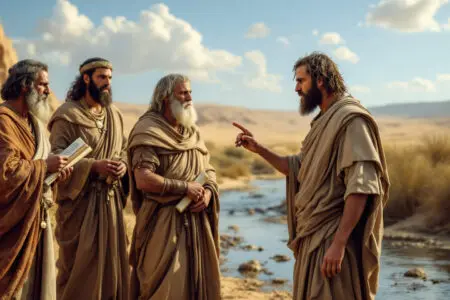It’s a line that lands like a punch to the gut. After ten verses of soaring, cosmic poetry about the Word who was with God and was God, the Gospel of John slams on the brakes and brings us crashing back to earth. It’s one of the most tragic sentences in the entire Bible. “He came to his own, and his own people did not receive him.”
Just let that sink in for a second. The creator visits his creation. The king comes to his kingdom. A father returns to his family, only to find the door bolted from the inside. This single verse captures a pivotal, heartbreaking moment in the divine story. If you want to grasp the core message of the Gospel, you have to wrestle with this verse. So, in this comprehensive John 1:11 Explained article, we are going to dive deep into the history, the theology, and the personal challenge of this powerful statement.
We’ll unpack who “his own” were, why they responded with such tragic rejection, and what this ancient verse means for us right here, right now. It’s a story of missed expectations, spiritual blindness, and ultimately, an invitation that still stands.
More in John Chapter 1 Category
Key Takeaways
- “His Own” Means Two Things: Primarily, the phrase points to the Jewish people, God’s covenant nation into which Jesus was born. But in a broader sense, it also means all of humanity, since Jesus is the Creator of all.
- Rejection Came from Expectation: Many first-century Jews wanted a political, warrior Messiah to overthrow Rome. They weren’t looking for a humble servant talking about a spiritual kingdom. Jesus simply didn’t fit the mold they had created.
- Leaders Drove the Rejection: The religious authorities of the day saw Jesus as a direct threat to their power and traditions. They actively worked to discredit Him and turn the people against Him.
- The Rejection Wasn’t Total: It’s crucial to remember that many Jewish people—including all twelve disciples and the very first Christians—did receive Jesus as the Messiah. The verse is a general statement about the national response, not every individual.
- The Invitation Is Still Open: The tragedy of verse 11 is immediately answered by the incredible promise of verse 12, which offers the right to become a child of God to anyone who receives Him by faith.
Who Exactly Were ‘His Own’ People?
When John says Jesus “came to his own,” he’s tapping into a deep well of Old Testament history. The phrase points directly to the nation of Israel.
This wasn’t just any nation. God had chosen them centuries earlier, starting with a promise to one man, Abraham. Through covenants, prophets, and the Law given to Moses, God had set Israel apart. They were the people He promised to bring the Messiah through—a Rescuer who would save not only them but the whole world. The Old Testament is the long, messy, beautiful story of this relationship.
So, Jesus wasn’t born in a vacuum. He was born a Jew, in the Jewish land, from the line of King David, hitting every mark of long-awaited prophecy. He came to the very people who had been preparing for his arrival for millennia. They were, in the deepest sense imaginable, His own.
Was This Rejection Universal Among the Jewish People?
No. And it’s critically important to get this right. Reading John 1:11 as a blanket condemnation of every Jewish person at the time is a complete misreading of the Bible.
Just think about it for a moment. Who were the very first people to drop everything and follow Jesus? They were all Jewish. Peter, Andrew, James, and John were Jewish fishermen. His closest friends—Mary, Martha, and Lazarus—were Jewish. His own mother was a devout Jewish woman. The crowds that hailed Him as king on Palm Sunday were Jewish crowds. The first church, born in Jerusalem on the day of Pentecost, was made up of thousands of Jewish believers.
John’s statement is a generalization. It’s like saying “The town voted for the new mayor” when the election was actually close. He’s talking about the response of the nation as an official entity, especially its religious and political leadership. The gut-wrenching truth is that the very people who should have recognized Him first, the shepherds of Israel, were the ones who led the charge against Him. They failed to receive their king.
What Did It Mean That He ‘Came to His Own’?
This was no distant, hands-off visit. The incarnation itself is the ultimate act of “coming to his own.” As John 1:14 puts it, the Word “became flesh and dwelt among us.” God put on skin. He breathed our air, walked our dusty roads, and felt our joys and sorrows.
His entire ministry was an act of coming to His people. He taught in their synagogues. He healed their sick. He ate in their homes. He went to their festivals in Jerusalem. He debated with their brightest theological minds. He wasn’t some outsider looking in; He was family, speaking from the heart of the home.
This is what makes the rejection so sharp. He wasn’t a stranger they turned away. He was the long-awaited family member, and when he finally showed up, they didn’t recognize him.
Why Didn’t They ‘Receive Him’?
This is the million-dollar question. The answer isn’t simple. It was a perfect storm of political pressure, wildly incorrect expectations, and plain old spiritual blindness. They were looking for a specific key to fit a specific lock, and when Jesus showed up with a master key that opened a door they didn’t even know existed, they refused to believe it was the real thing.
Did Their Messianic Expectations Get in the Way?
Absolutely. This was probably the biggest hurdle. For centuries, Israel had been crushed under the boot of foreign powers—Babylon, Persia, Greece, and now Rome. They were desperate for a liberator. When they read the prophecies about a Messiah, they zeroed in on the parts about a conquering king, a new David who would smash their enemies.
They were looking for a lion. Jesus came as a lamb.
They wanted a revolutionary who would lead a glorious uprising against Caesar. Instead, they got a humble teacher from a backwater town in Galilee who talked about loving your enemies. He spoke of an upside-down kingdom where the last come first and the greatest is the servant. This was not the Messiah they had ordered. His message about an internal, spiritual kingdom seemed completely out of touch with their very real, physical oppression.
How Did the Religious Leaders Influence This Rejection?
The religious establishment—the Pharisees, Sadducees, and scribes—saw Jesus as a threat to their entire way of life. He didn’t ask for their permission. He ignored their man-made traditions, accusing them of just going through the motions of religion.
Worse, He claimed to have God’s authority. He forgave sins. He reinterpreted the Law of Moses. To them, this wasn’t just arrogance; it was blasphemy, a crime punishable by death. He threatened their power, their position, and their system. So, they launched a campaign to discredit him, twisting his words and setting traps until they could finally turn everyone against him.
It reminds me of something from my own life, on a much smaller scale, of course. In college, I had a roommate I decided I couldn’t stand from day one. I’d built up a whole story about him in my head based on his major and the music he listened to. I figured he was arrogant and aloof. For months, I barely said a word to him. I didn’t receive him.
Then one night, while we were both stressing about finals, we actually talked. And it shattered my whole perception. He was kind, funny, and just as insecure as I was. In my own small world, I had failed to recognize the real person right in front of me. This tiny experience helps me understand a sliver of the profound tragedy of John 1:11. They had their picture of the Messiah, and Jesus didn’t fit the frame.
Is There a Deeper, More Universal Meaning to This Verse?
While the immediate story is about Israel, the implications ripple out to every single one of us. John’s prologue makes a staggering claim: “All things were made through him” (John 1:3).
That means this whole world is “His own.” This planet is his handiwork. Every person is his creation. In that sense, when the Creator walked into his creation, the creation largely didn’t recognize him. John even says as much a few verses earlier: “The light shines in the darkness, and the darkness has not overcome it” (John 1:5). We all have a tendency to prefer our own comfortable darkness to the brilliance of his light.
The story of Israel becomes a mirror. Their rejection is our rejection. Their story is our story.
How Does This Relate to Us Today?
The question of “receiving Him” is not a historical one. It confronts every one of us. It’s easy to read this and shake our heads at those blind first-century people. But are we really so different? We might not use a cross, but we have our own subtle ways of not receiving him.
We fail to receive Him any time we try to create a Jesus in our own image.
- We want a Political Jesus, a mascot for our party who agrees with our platform, and we ignore everything he said that makes us uncomfortable.
- We want a Therapist Jesus, a life coach who only offers inspirational quotes, and we skip over his calls to repent and deny ourselves.
- We want a Private Jesus, a personal savior who makes no demands on how we treat our neighbors, care for the poor, or engage with the world.
- We want a Sunday Jesus, someone we visit for an hour a week but keep locked out of our work, finances, and relationships.
Any time we settle for a version of Jesus we’re comfortable with, rather than the Jesus of the Bible, we’re making the same mistake. We are failing to receive Him as He truly is.
But What Happens When Someone Does Receive Him?
This is where the story pivots from tragedy to breathtaking hope. Verse 11 isn’t the end of the story. John immediately follows it with one of the most glorious promises ever written.
“But to all who did receive him, who believed in his name, he gave the right to become children of God” (John 1:12).
This is the stunning plot twist. The rejection by “His own” didn’t ruin God’s plan. It blew the doors wide open for a new kind of family, one not based on bloodline or ethnicity, but purely on faith. By receiving Him—by trusting in who He is—we are given a new identity. We’re adopted. We are brought right into God’s own family. This radical idea of spiritual adoption is a cornerstone of Christian faith, and you can explore its depths through resources from institutions dedicated to biblical scholarship, such as the Yale Divinity School’s Bible Study programs.
The national rejection paved the way for an international invitation. The locked door in one house led to an open door for the entire world.
Conclusion: An Invitation That Still Stands
The message of John 1:11 Explained is both a sobering warning and a beautiful invitation. It’s a warning against being so sure we know what God is doing that we miss him when he shows up in an unexpected way. It’s a call to humility.
But it’s so much more than a warning. It’s an invitation. The tragedy of the rejection is completely eclipsed by the miracle of adoption offered in the very next sentence. The story doesn’t end with the locked door. It ends with an open one. The question John’s Gospel leaves hanging in the air isn’t about what they did two thousand years ago.
It’s about what you will do today.
He still comes to His own. The question is, will we receive Him?
FAQ – John 1:11 Explained

What is the core message for us today from John 1:11?
The core message is a call to humility and reflection on how we might also fail to receive Jesus in our own lives by creating a version of Him that fits our preferences, and an invitation to accept Him as He truly is, which leads to spiritual adoption and new identity as God’s children.
What is the significance of ‘coming to His own’ in the context of Jesus’ incarnation?
‘Coming to His own’ signifies that Jesus, the Word, took on flesh and lived among His people, actively engaging with them through teaching, healing, and participating in their lives, making the rejection especially poignant because He was part of their community.
Does John 1:11 imply that all Jewish people rejected Jesus?
No, it does not mean every Jewish person rejected Jesus. Many of His earliest followers and the first Christians were Jewish. The verse is a general statement about the national response, especially among the religious and political leadership.
Why did the people, especially the Jewish leaders, reject Jesus according to John 1:11?
Rejection occurred due to a combination of mistaken expectations for a political liberator, spiritual blindness, and the religious leaders’ view of Jesus as a threat to their power and traditions, which led them to actively oppose Him.






